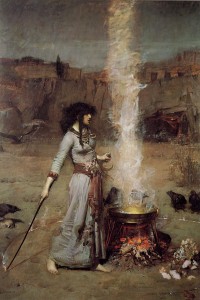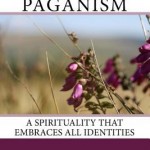
1. That Wiccan theology is diverse
This one applies equally to Wiccans, polytheists, and everyone really. In Wicca, you can be a pantheist, a polytheist, an atheist, a duotheist, a monist, a Neoplatonist monotheist, a polymorphist, or all of them at once, and hardly anyone minds.
Sable Aradia explains all about it in The Many Faces of Wiccan Divinity.
2. That there are many different types of Wicca and witchcraft, but not all witches are Wiccans
There are many different types of Wicca, some initiatory, some lineaged, some descended from Gerald Gardner, some not. They have a variety of practices and styles. In the UK, Gardnerians and Alexandrians will happily work in the same circle and there are many dual-heritage covens. In the UK and Europe, we believe that you don’t have to start a new tradition just because you changed something about your rituals. In the US, Gardnerian and Alexandrian covens are referred to as “British Traditional Wicca”.
There are also other types of witchcraft – Reclaiming, Feri, Cochrane Tradition, 1734 Tradition, and many others – which do not use the name Wicca to describe themselves.
Not all witches are Wiccans, but all Wiccans are witches.
3. How to ask for training and initiation
If you write to a coven and ask for training in Wicca, do expect that there will be travel involved, and face-to-face meetings and rituals. Most people don’t offer correspondence courses. Wicca is hands-on.
If you have already done a self-initiation ritual, that’s great, but please don’t be offended when the coven wants you to be initiated into their coven and lineage. Self-initiation can be a wonderful and meaningful experience and a genuine encounter with the Pagan deities, but it is different from an initiation into a lineaged coven.
When you get to the end of the training, you may be ready for first-degree initiation. It is up to you to ask for first degree initiation, as the coven will not want you to feel pressurised into it. It is not automatically the outcome of Wiccan training – the coven may decide that you are not a good fit for them, or that you are not ready for initiation. This will probably become apparent before the end of the training, both to you and to them, however.
After some time of being a first degree, you may feel that you are ready for second degree initiation. However, it is up to the coven to offer it to you, and not up to you to ask for it. This is the other way around from first degree.
Having said all that, different covens may feel differently about this, so it is a good idea to ask what their practice is.
4. Traditional Wicca does not cost money
We do not charge for face-to-face coven training. People might ask for financial contributions for temple sundries (candles, incense, etc) and for paper handouts. Every covener is expected to bring a contribution of food for the feast.
I do believe it is legitimate to charge for handfastings, baby-namings, Tarot readings, rune readings, workshops at events, and so on.
I have thought quite long and hard about Pagans’ relationship with money, and concluded that we need to talk about it more.
5. Wicca is a religion and a craft
Some seekers seem to be under the impression that Wicca is only a set of magical techniques, and that they will not need to engage with Pagan deities. Nope, Wicca is a Pagan religion, and that means we honour Pagan deities.
There are Christo-Pagans and Christo-Wiccans and Jewitches, who worship Yahweh and Asherah, or Yahweh and Shekhinah, or Jesus and Mary… but most Wiccans are Pagans.
There are also apparently some who believe that Wicca is not witchcraft. Yes it is. The name Wicca was used to refer to the Craft when it was difficult to use the word “witch” because people automatically associated it with devil-worship. But the vast majority of Wiccans regard ourselves as witches.
6. There is no such thing as “black witchcraft” and “white witchcraft”
One of the most annoying questions that witches get asked is “are you a black witch or a white witch?” There are so many things wrong with this question.
The categories of white and black witchcraft were created by the Church persecution of witches, as they believed that white witches conjured angels, and black witches conjured devils. They do not apply in a Pagan context, because Pagan cosmology and theology does not include angels and devils, or opposing cosmic principles of good and evil.
It is racist to associate “black” with evil. As I wrote in my essay “Is it meaningful to speak of queer spirituality?” [1]:
[Robin] Hawley-Gorsline suggests that darkness is generally seen as a negative cultural meme – dark sexuality, dark continents, dark people – and that Christian spirituality is focused on the light. This negative view of darkness increases its power as a meme; darkness is equated with exotica, especially sexual difference. Blacks and blackness are associated with sexuality and sensuality; and ‘deviant’ sexuality is kept hidden, in the dark. An African American transgendered activist, Miss Lorrainne Sade Baskerville, said to Saadaya:
“Why is black the color of evil? Why is the color black bad and impure and why does white represent light, wisdom and purity? … Black is [a] mysterious color, a beautiful color! It represents mystery!”
Most Wiccans and other witches believe that our magic comes from energies inherent in Nature, and have very little to do with the supernatural. So, if someone asks me the question, my reply is usually, “I’m a green witch”.
The question also implies a black-and-white view of morality and ethics, whereas we tend to believe that morality is complex and contextual.
7. The Threefold Law doesn’t mean what you think it means
The Threefold Law is an injunction to return good threefold when you receive good. It is not a belief that if you do harm, there is some cosmic karmic law that causes you to receive threefold harm in return.
[1] Is it meaningful to speak of ”queer spirituality”? An examination of queer and LGBT imagery and themes in contemporary paganism and Christianity, chapter in Contemporary Christianity and LGBT Sexualities ed. Stephen Hunt, Ashgate Publishing, 2009.
















